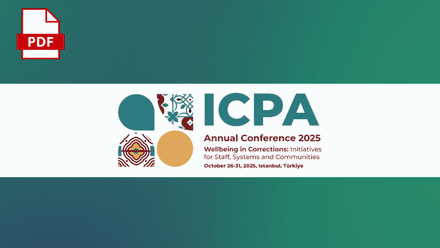ICPA Juveniles Network shares resources on the safeguarding processes within juvenile secure settings
________________________________________________________________
This month, Juveniles Network is shining a spotlight on the safeguarding processes within juvenile secure settings and using physical restraint as an absolute last resort.
Article 37 of the United Nations Convention on the Rights of the Child creates special obligations on the state to protect young people in custody, ensuring they are treated with humanity and respect for their inherent dignity. States should implement comprehensive measures, including legislative reforms, to protect children's rights within the justice system and prohibit all forms of violence against children in custody.
1. Minimising and Managing Physical Restraint (MMPR)
This framework document represents a significant advancement in safeguarding processes within juvenile secure settings. Developed in response to the 2008 Independent Review, it provides comprehensive guidance for staff working in secure facilities, emphasizing de-escalation techniques and establishing physical restraint as an absolute last resort.
2. Independent Review of Restraint in Juvenile Secure Settings
This review, triggered by the tragic deaths of Gareth Myatt and Adam Rickwood, thoroughly examined restraint practices across the UK's secure youth estate. Its 28 recommendations led to fundamental changes in how physical interventions are managed and monitored in juvenile secure settings.
3. Government Response to Use of Restraint in Juvenile Secure Settings
The government's comprehensive response to the Independent Review demonstrates a commitment to reform, accepting most of the 58 recommendations and establishing key initiatives such as the Restraint Accreditation Board. The implementation report shows significant progress, including a notable reduction in youth custody numbers and improved staff training programs.
4. Evidence On Youth Detention: Solitary Confinement And Restraint
Current research from Northumbria University provides crucial insights into the psychological impacts of restraint on young people, particularly highlighting gender-specific experiences and international legal frameworks, including the UN Convention on the Rights of the Child.
Impact and Ongoing Initiatives
The ICPA Juveniles Network continues to drive positive change through various initiatives, including:
-
Participate in international conferences and workshops focusing on youth justice reform
-
Development and sharing of evidence-based practices across jurisdictions
-
Advocacy for human rights-compliant youth detention practices
-
Promotion of family engagement and age-appropriate programming
Through these efforts, the network maintains its commitment to transforming juvenile justice systems globally, ensuring they prioritize rehabilitation, education, and positive youth development.
For more information about the ICPA Juveniles Network and its initiatives, visit the Juveniles Network page.


